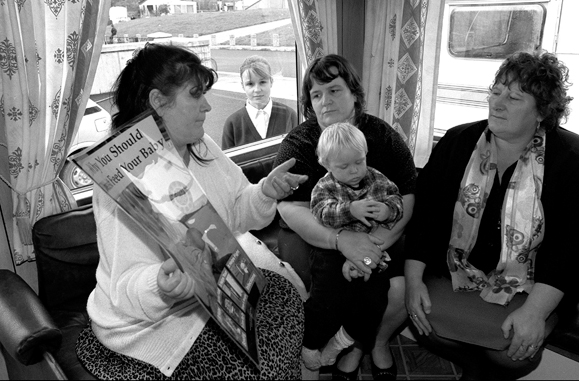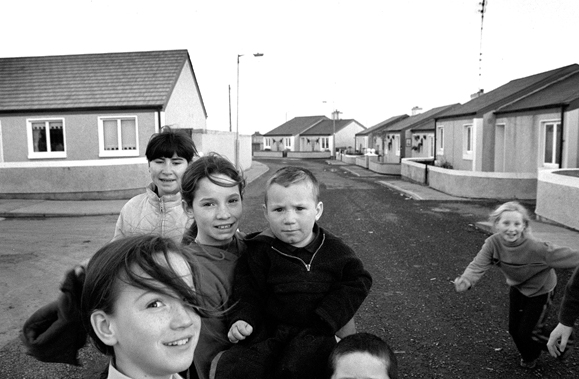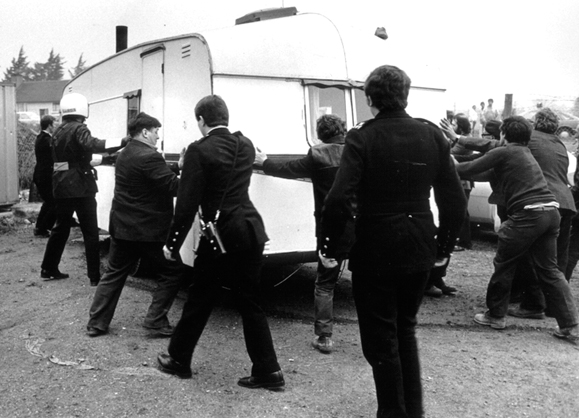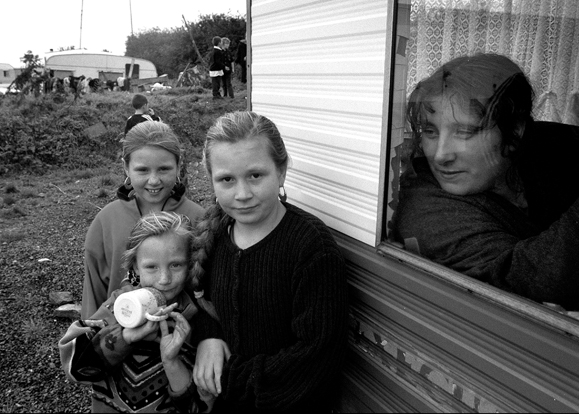In a small village in County Galway, a group of parents decided to keep their children home from school. Their school has just 12 pupils between four and 12 years old, but parents closed it down for a week last September, because they wanted to keep other children out.
The children they wanted to keep out were also Irish. Their parents had grown up in the area, Ballinruane near Menlough, and wanted to return there after spending ten years abroad. But they were “Travellers” and that was a problem.
Travellers are an ethnic minority with a long and colorful tradition in Ireland. And a lengthy history of discrimination: The stand-off in Co. Galway only ended when the Travellers — four families who had made arrangements for nine of their children to attend St Joseph’s School — decided to move on. It was a bitter parody of the forced evictions of Ireland’s past.
There are an estimated 25,000 Travellers in the Republic of Ireland, and around 1,500 in Northern Ireland.
Most of them live the life of their ancestors, roaming from place to place in caravans they park along the roadside, or in government-built “halting sites,” moving on when farmers and others call the police to evict them.
Years ago, the Travellers were credited with bringing Irish music and storytelling from one community to the next. Many present-day musicians will acknowledge their contribution. Ireland’s famous balladeer, the late Luke Kelly of The Dubliners, sang a song in deference to the Travellers which included the words: “Move along, get along, move along, get along, go, move, shift.”
Although the history of the Travellers is not very well documented, research shows references to them in Ireland as far back as the 12th century. This nomadic group has its own language, known as “cant” or “gammon,” and referred to by academics as “shelta.” But they speak English too, only using their own language among themselves.
In the past, Travellers worked as tinsmiths, seasonal farm laborers, and scrap merchants and were welcomed in rural places where they mended buckets and other farm implements in exchange for food and a place to park. Today, however, many Traveller families depend on social welfare for their existence.
According to the Irish government, which recently set up a National Traveller Health Strategy, Travellers’ life expectancy is 11 years less than that of a settled person in Ireland. Infant mortality rates are more than three times the national average, and Travellers have double the national rate of stillbirth and double the national rate of childbirth. Crib death was found to be 12 times more common among Travellers’ babies.
The Director of Public Health at the Mid-Western Health Board, Dr Kevin Kelleher, said that the statistics are alarming. “If you look at Ireland itself, our life expectancy is below the European average, and then you have a section of the Irish community, whose life expectancy is even below that,” he said at a recent public health conference.
“Traditionally the problem is that the services we provide are not attuned to the needs of the Travelling community,” he said. The health services have much to learn about dealing with Traveller traditions, such as dealing with death. “In a situation of death, the entire family and more will want to be in hospital for the last moments of the patient’s life and in general hospitals are not prepared for this. It creates an unhappiness between both Travellers and hospital staff that can be overcome.”
The health services may be making somewhat of an effort to reach out to the Travellers, but not enough is being done, say the people at Pavee Point, a group set up to promote Travellers’ rights. “Pavee” is a name used by Travellers to describe themselves. The organization says that Travellers’ life expectancy is equivalent to that of settled people in the 1940s, and cites a 1986 Economic and Social Research Institute report which found that only five percent of Travellers live to be 50 years old, while only one percent lives until 65, compared to 11 per cent of the settled population.

But the main problem being faced by Travellers, according to Caoimhe McCabe, a spokeswomen for the organization, is that of accommodation. There are not enough halting sites available, she said. “A lot of people presume that Travellers want to live on the side of the road with no facilities, but that’s not the case. They want access to electricity and sanitation, but they also want to live as they always did [moving on when they want]. They should not have to deny that part of their culture. They are used to living within their immediate family group and moving around a lot. It’s alien to them to be put in a halting site with lots of other families and to be told to stay there.” Pavee Point is campaigning for a system of “transient” halting sites, where a family could move from one to the next when a vacancy arises.
If the accommodation problems are not dealt with, the problem of Travellers moving onto private land will continue,” adds Ms. McCabe. And therein lies the nub of the problem. Travellers protesting at the lack of available serviced halting sites continually move their camps on to private land. They stay a while before being moved on by the police. Then they go a few more miles and park on someone else’s land. Along come the police and the cycle continues.
Travellers are sometimes feared and often despised, blamed for crime, and said to be living off the state, uneducated and unwilling to live in a “normal community.” They are refused service in pubs and shops no matter how much money they may have. When they marry, they must travel the country to find a venue, and when one of their clan dies, they gather in thousands to mourn.
This summer in Ireland a number of newspaper reports dealt with the outrage of local citizens at the piles of rubbish left after an encampment had been cleared. In one case outside Dublin, the damage was so great that the clean-up bill was estimated at 70,000 Irish pounds.
And, as I write this article, a debate is raging on a radio talk show about an illegal Traveller encampment on the banks of the Dodder River in South Dublin. A spokesman for the local Council, which is responsible for providing accommodation for Travellers, said that six of his staff of eight are not in work because of stress-related problems caused by the public who were continuously harangueing the Council about not doing its job. There are complaints about a couch and a burned out car on the river’s banks, allegedly belonging to the Travellers.
“That’s not a common experience,” counters McCabe, pointing out that the media are quick to report negative stories about Travellers and don’t bother looking for positive things to report. “You never hear of cases when they leave an area and it’s clean.”

There have also been reports of Travelling families extorting money from businesses, by pulling their caravans on to private land, and refusing to leave unless they are paid to do so. Because it can take some time for the police to get an eviction notice, companies usually pay up rather than wait and risk damaging their business in the meantime.
Anecdotal evidence suggests that this has happened, McCabe admitted, but she thinks that such reports may be exaggerated. “I don’t condone that, and people who do it should be prosecuted,” she said, agreeing that Travellers sometimes contribute to their own bad press by their behavior. “Appearing in a newspaper for fighting brings notoriety, they think that’s great,” she said. “People take the high moral ground, but the `fighting Irish’ is not an uncommon stereotype generally.”
So why are Travellers discriminated against? In song and in story, the “Tinkers,” as they were then known in the days before political correctness, were a cherished part of Irish society. What happened?
“I think discrimination was always there,” said McCabe. “But since other ethnic groups (Ireland is experiencing an influx of refugees) have come to Ireland it’s worse. Attitudes have hardened and become more entrenched. The situation has gotten worse for many Travellers, and the settled community has a responsibility to see that they get their full human rights.”
Since the mid-80s, however, Travellers have been participating, in growing numbers, in groups organized to give them a voice at local and national level and to campaign for better conditions. There are how 40 Travellers’ organizations nationwide, and Travellers are becoming more empowered in terms of community development.
There are currently 17 health care projects where Traveller women are trained by local health boards to work in their own communities on public health issues. They liaise with health boards to set up medical appointments and to ensure that “culturally appropriate treatment” is delivered, McCabe said.
One Traveller who is studying community work is Julie Nevin, currently training as an outreach worker at Maynooth College in County Kildare. She has lived in the neighboring County Laois for 12 years: in a house with her husband, John, and their four daughters, Mary, Jean, Winnie and Catherine, for the last eight years, and in a caravan on a halting site for the four preceding years.
“I love traveling,” Mrs. Nevin said, “but I took a house because it was too hard on the children in the winter. It was lovely [traveling], but we might get a week in a camp and then the guards would run us off and we’d have to drag the kids out of school and start somewhere else. Now we just go away for two or three weeks in the summer.”
Mrs. Nevin and her family, one of just 2,000 Traveller families to live in housing, found it difficult to settle into a house at first, and things were not helped by her neighbors, who didn’t want them there. “It was hell on earth,” Mrs. Nevin recalls. One of her daughters was hit on the forehead by a stone thrown by a neighbor. “When I asked why, I was told: `Because she is a f…ing knacker.’ Then our walls were covered in graffiti calling us names. It was terrible.”
The Nevins stuck it out, however, and finally their neighbors settled into a state of grudging acceptance. The children made friends and eventually things improved. “It was just fear of the unknown on both sides,” Mrs. Nevin said. “Young people hear so much talk from their parents and from other kids at school that they think it’s okay to treat us badly. But there are some good settled people and some bad Travellers. Innocent children just get caught up in the discrimination.” She believes that people should be taught about Travellers’ culture to remove the fear of the unknown. “Kids need a better understanding of the fact that it’s okay to be different,” she opined.
Mrs. Nevin is a remarkably strong woman, a leader in her community who finds time to study for a diploma despite the fact that she dropped out of school at the age of 12, a situation common among Traveller children. “When you are shifted from camp to camp it’s not easy to keep Children in school,” she said.
Referring to the situation in the Galway school, Mrs. Nevin said that Travellers’ children are usually asked to sit at the back of the class and are treated differently than other kids when they are accepted in a school. Schools that agree to teach the children receive extra funding, but take the children out of class for remedial teaching, a situation she condemned. “How are they supposed to mix? If they need extra help they should have homework clubs after class, they should not remove the children during class because then they certainly won’t learn. And the differences are again being played up.” She moved her own daughters out of one school to avoid just such a situation.

She has happy memories of her childhood, and a strong appreciation for the values passed on by her parents. “They had a huge respect for each other, for the family, and for marriage. They had a love of nature and a deep community spirit. They supported each other and were deeply religious.”
The way forward for the Travelling community, she believes, is through more integration and more understanding on both sides. “When we want to live in towns people must get used to that. Some people want halting sites, and that’s okay, but they must be serviced. Others want group housing, and that’s okay too.”
Since 1995 the government has introduced a series of Accommodation Consultancy Committees on a regional level designed to deal with the problem. These committees are working with local councils to arrange accommodation for Travellers. It was supposed to be a five-year plan to have all Travellers’ living needs taken care of, but there’s still a long way to go.
In Portlaoise town, where the Nevins live, the local halting site is in the middle of an industrial estate, surrounded by oil factories. The overhead barriers at the entrance are locked at night and there are no fire hoses. If a fire were to occur, Mrs. Nevin says, it only takes a caravan three minutes to burn. The fire department would never get there on time. The local council allegedly refused permission to build a house in the area, saying it is not residential land. But it’s obviously good enough for Travellers, she noted ironically.
“If you haven’t got accommodation with toilets and clean water you can’t have good health,” Mrs. Nevin insisted. “And if you can’t stay somewhere as long as you like, your kids can’t get an education.” ♦


Leave a Reply